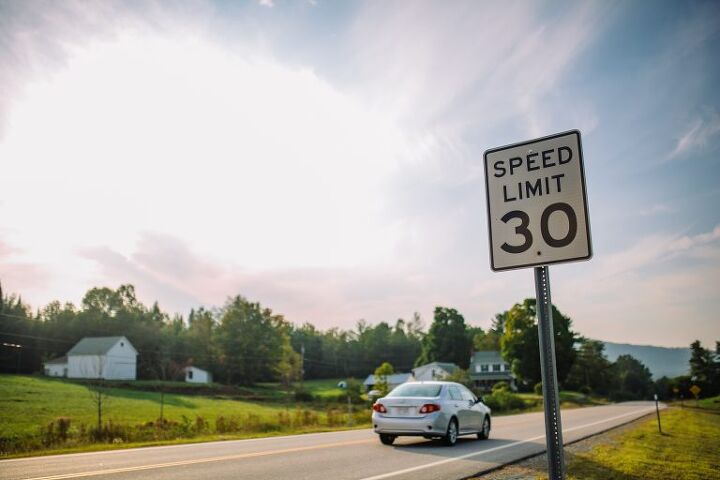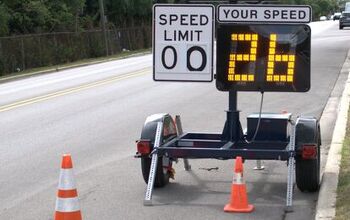Are Speed Limiters Coming to American Cars?

Carscoops is reminding us that a law passed in 2019 is mandating that new cars introduced after 2022 must be fitted with speed limiters.
Here’s the good news, at least for us Yanks and Canucks — the law was passed by the European Union and applies to, well, Europe.
That said, Carscoops is sounding the alarm. Could speed limiters come to North America?
To be clear, the limiters don’t appear to make it physically impossible for drivers to go over the speed limit, but rather the tech uses things like flashing lights to get the driver’s attention so he/she can slow down.
While we applaud efforts to reduce accidents, we find tech limiting speed at this level to be a bridge too far. It’s one thing for automakers to limit speed at levels we’d never even attempt to attain on public roads — lots of cars are capped by the factory, usually at 155 — or to set a speed limiter to match the tires’ speed rating. It’s another to be this heavy-handed.
The tech supposedly uses a combo of GPS and traffic-sign recognition, and we’d point out that sometimes both technologies fail. We also don’t like the idea of having our speed clipped without providing for context — even those who mostly maintain the limit occasionally climb above to execute a pass more safely. And do I want my car screaming at me during a medical emergency that requires me to drive faster?
I get it. There are some birdbrains out there doing 50 in 25 mph residential zones where kids are playing, and that’s not cool. But context matters. Ten over on the interstate is less objectionable — and probably less dangerous — than 10 over in the congested city. And drivers should be able to make that choice for themselves, without a safety nanny scolding them.
Carscoops’ actual evidence for the emergence of this tech in America is thin — the site cites a video from a British motoring journalist and also makes the “hey it could happen here, but there’s no strong evidence it will” argument. I realize I could be simply aggregating a blog that’s mind to catch clicks on a slow news day in our own attempt to have content (and thus catch clicks).
Or this could be one of those creeping privacy invasions this site is constantly screaming about. Remember, even if the feds never do something like this, it could, in theory, be done at the state level, though I’d imagine OEMs would kick and scream to avoid building cars both for states with and without speed limiters, because of the extra cost of building vehicles with separate tech for differing states.
I can’t foresee these coming to America (or Canada). But we’ll keep a wary eye out just the same.
[Image: Svitlana Pimenov/Shutterstock.com]

Tim Healey grew up around the auto-parts business and has always had a love for cars — his parents joke his first word was “‘Vette”. Despite this, he wanted to pursue a career in sports writing but he ended up falling semi-accidentally into the automotive-journalism industry, first at Consumer Guide Automotive and later at Web2Carz.com. He also worked as an industry analyst at Mintel Group and freelanced for About.com, CarFax, Vehix.com, High Gear Media, Torque News, FutureCar.com, Cars.com, among others, and of course Vertical Scope sites such as AutoGuide.com, Off-Road.com, and HybridCars.com. He’s an urbanite and as such, doesn’t need a daily driver, but if he had one, it would be compact, sporty, and have a manual transmission.
More by Tim Healey
Latest Car Reviews
Read moreLatest Product Reviews
Read moreRecent Comments
- Tane94 Awaiting the EV3 unveil this month. Kia continues to lead, though I will miss the Soul
- Jeanbaptiste I know this will never be seen, but the real answer is NO Government mandated tech. The reason why is that when the government mandates something, we miss out on signals that the free market will give to weather or not people actually want this or that this tech would actually help. It's like mandating AM radio for cars when people could just buy a $10 am radio if they really like am so much.
- 28-Cars-Later $12K? I needed a good laugh.
- EBFlex Wait...the feds are claiming that inflation was not FJBs fault 6 months prior to an election where he is massively losing in the polls in every single category?Eyebrow raised.
- MaintenanceCosts Most of the article after the blockquote is Posky laboring mightily to somehow blame this clearly anticompetitive and oligopolistic conduct on the big bad government.I look forward to some of the usual commenters explaining to us that, actually, the oil industry is a cuddly teddy bear and the real villain is people trying to sell us cars that don't use oil.

































Comments
Join the conversation
I thought most vehicles had speed limiters and 110 mph for trucks seems reasonable. I cannot get too upset about speed limiters as long as they allow you to go at least 80. As for cheapo tires manufacturers have been installing them for years and they can be replaced by better tires. Manufacturers don't want you to drive too fast otherwise you will not get close to the mpgs they post. MPGs drop significantly when you drive 80 or above.
Everyone...kindly refrain from using IIHS for literally anything. The only place our interests as drivers coincide with IIHS is the crash testing, and that is only because NHTSA hasn't kept up with the times... I've spent years reading their nonsense, and every study they do is for lower speed limits, more enforcement, and more limitations...period. Those of us who recall 55 mph NMSL and the battle to remove it know IIHS makes stuff up and writes the study to support it. IIHS is fully owned by the insurance companies, they aren't an unbiased observer-great fans of 55 mph, and they LOVED the 85 mph speedo. They never met a heavy hammer penalty, enforcement mechanism or camera they didn't love. We'd be the UK camera hell if it was up to them. Also, this isn't Streets Blog, who has a 100% anti car agenda and then will twist whatever to match it. The streets are for pedestrians argument never met a horse, or why sidewalks were invented, prior to the auto.....it wasn't some safe nirvana with thousands of horses in NYC streets, and streetcars elsewhere. I enjoyed their "the invention of Jaywalking" revisionist history but that doesn't mean it is true. Segregation of traffic is, interestingly, OK for Streetsblog when it is a hard median bike lane demanded by the 1% who use a bicycle in an urban enviroment, but not for pedestrians. Sidewalks for peds...hard bike lanes for bikes (riding a bike in a big city on the street in the US is a risk I won't take....meat on a stick). We may argue all we want, but the Germans have a great saying "They'll put But He Had Right of Way" on the tombstone....There is a reason we don't allow horses on the interstate...it all comes down to speed differentials. Dedicated bus lanes ? Sure. Light Rail ? Sure. I'm not against changing the streetscape, including closing streets where valid to all auto traffic, but putting essentially stationary bikes on a moving roadway is an invitation for disaster and the answer is segregate users according to type, not reform the entire system back to 1800. Why can't I walk on a railroad right of way ? People existed in the woods long before trains were invented. A ped always has right of way, full stop, but encouraging safe habits appears to be missing from the VZ mindset, in lieu of car hatred.